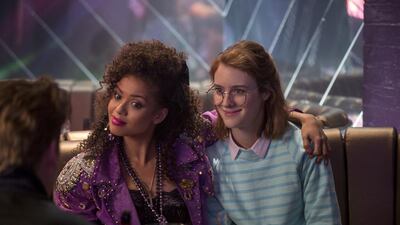Human folly and the dark side of technology combine in Black Mirror, a haunting series of one-off television dramas that has literally come back from the dead to tap into our collective unease about life the modern world.
Hailed during its original run by horror legend Stephen King, no less, as "terrifying, funny, intelligent" and "like The Twilight Zone", the series appeared on Britain's Channel 4 in 2011 and 2012, with six episodes spread over two seasons, followed by a one-off Christmas special in 2014. No further episodes were commissioned and the mirror shattered.
That seemed like the end of the story until, ironically, technology came to the rescue. When video-streaming service Netflix put the episodes online for an international audience, it started to build a global cult following, thanks to brilliant stories that tap into our fears about life in the internet age and the effect it is having on human relationships – with unforgettable, often unsettling, conclusions.
Netflix executives took note and, to the delight of critics and fans, revived Black Mirror with an order for 12 new episodes. The first six will be available to stream from tomorrow.
“We’re living in a time of immense flux and change,” says Charlie Brooker, the British broadcaster who created the series and writes most of the episodes, with eerie prescience and daring originality. “It’s exciting, but it’s worrisome, and I guess this show is reflecting that – no pun intended.”
The disturbing, challenging storylines from the original Channel 4 episodes included a bereaved young woman ordering a humanoid replica of her dead partner; a pitiless talent show destroying the lives of its contestants in a virtual coliseum; and a society where every memory from birth is saved on a chip implanted in the brain and available for instant replay.
The cast list included a few notable British actors, including Lindsay Duncan (Birdman, Alice in Wonderland), Rupert Everett (My Best Friend's Wedding), Hayley Atwell (Marvel's Agent Carter) and Domhnall Gleeson (Star Wars: The Force Awakens, The Revenant). Mad Men's John Hamm also showed up in the Christmas special.
The new episodes not only have a bigger budget, but also a high-profile international cast featuring Bryce Dallas Howard (Jurassic World), Gugu Mbatha-Raw (Doctor Who, Concussion), Mackenzie Davis (The Martian), Malachi Kirby (Roots), Kelly MacDonald (Boardwalk Empire, Trainspotting), Michael Kelly (House of Cards) and Alice Eve (Penny Dreadful).
The third-season opener, Nosedive, stars Howard as Lacie, an insecure office worker who lives in a happy, smiley, status-obsessed nightmare world in which everyone is tagged with a numerical popularity rating that can change by the minute.
“It’s a future world in which we all rate one another, according to our interactions and social media,” says Howard.
“It’s a lot like ... how you rate an Uber driver, or an Airbnb. It’s kind of just a click away from where we are now. If you’re above a certain rating, then you have access to certain privileges in life. And if you’re below a certain rating, then you are denied that access. It’s a very high-stakes world in terms of making sure you’re liked by other people.”
The move to becoming a Netflix Original series also allowed the creative team to work without any timing constraints and fewer content restrictions.
“Because we’re doing six [episodes], we wanted more variance in tone than we’d had before,” Brooker says. “We didn’t necessarily want every single episode to be just unrelentingly bleak.
“We’re approaching it like we’re doing little, different genre movies. So we’ve got, like, a detective film, a romance, and an out-and-out horror one, for instance. It’s kind of like curating a little film festival.”
Canadian actress Davis, who is fresh off her appearance in The Martian and is now filming Blade Runner 2049 with Harrison Ford and director Ridley Scott, stars in an episode called San Junipero. It is set in 1987 in the titular fun-loving California beach town. For new arrivals Yorkie (Davis) and Kelly (Mbatha-Raw), it will change their lives.
"San Junipero is our most romantic episode to date," says Brooker.
"It came about because I was wondering: 'Could we ever do a vintage episode of Black Mirror? Could we ever do one that's not set in the present day?' It's very much influenced by 1980s cinema and 1980s pop culture."
Despite his dark visions, Brooker still sees a few rays of hope breaking through the threatening clouds of evolving, omnipresent technology.
“I’m quite optimistic, weirdly, overall, when it comes to things like social media – I think it’s an incredible invention,” he says.
“It’s just that we, as an animal, aren’t yet adept at using this incredible new power we’ve been given. And so we’re flailing. It’s like a new limb we’ve grown, and we’re flailing around and knocking all the furniture over.”
Six new episodes of Black Mirror will be available on Netflix from Friday, October 21. The previous episodes are also available
artslife@thenational.ae

